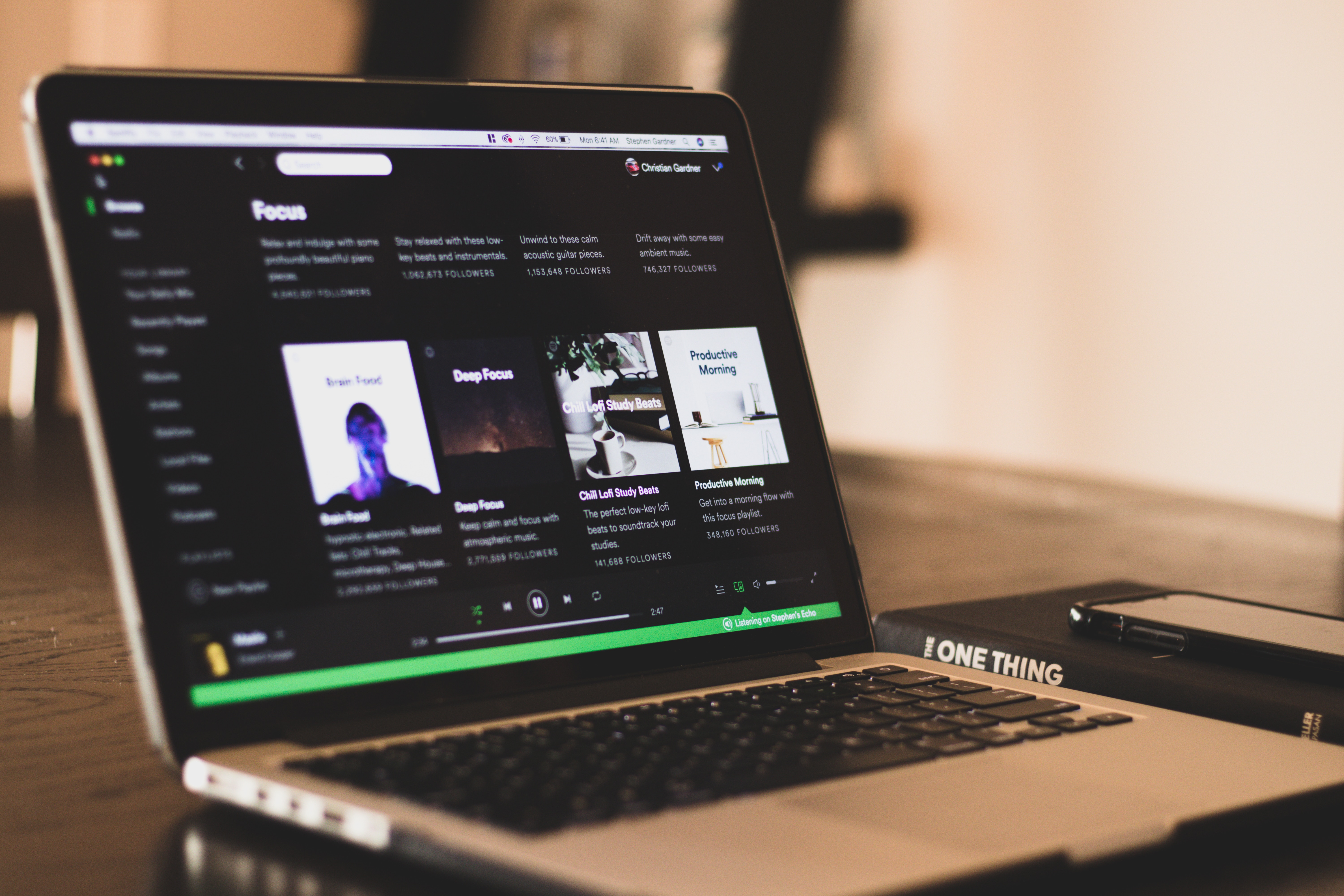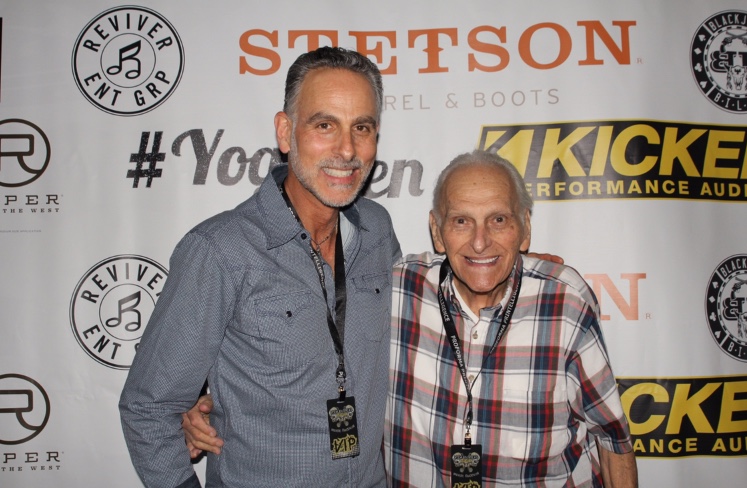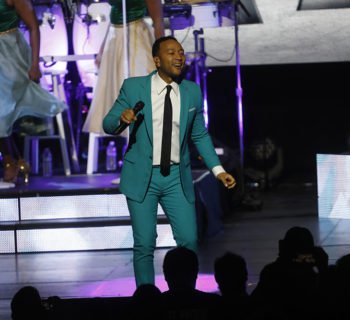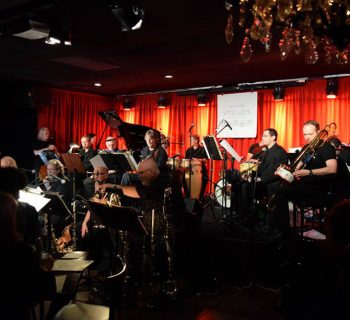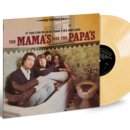Hall and Oates need no introduction (well, just about none). The Rock & Roll Hall of Famers have sold roughly 40 million records since releasing their debut, Whole Oats, in 1972. Their ubiquitous singles––63 in total—include six #1 hits: “Out of Touch,” “Rich Girl,” “Kiss on My List,” “Private Eyes,” “I Can’t Go for That (No Can Do)” and
“Maneater.” Oh, and they just happen to be the bestselling music pair of all time.
This year, the indefatigable duo are camping out in Las Vegas for a three-night residency at Caesars Palace, after which they’ll perform in England, Scotland, Germany—and then tour South America for the first time ever.
Music Connection recently caught up with Charleston-based Hall and Nashville-based Oates to talk about their legendary career, Benjamin Button-like
fanbase and much more.
Music Connection: The last time you played Caesars was in October 2014. How has your chemistry, onstage and offstage, evolved since then?
Daryl Hall: It’s always the same. It’s kind of like having a brother. It’s like time stops. We get onstage and just play. We know each other so well, it doesn’t require much unless we want to dust off an old song. It’s just seamless.
When we first met, we were teenagers, right out of high school. We didn’t get together to play; we met because we were musicians, we hung out, we did some crazy stuff––hippies hanging around Philadelphia.
We’re hardly ever in touch, to be honest. Neither of us are interested in small talk. Really, we just get together and play.
John Oates: The chemistry of the band is really important, it’s the way all six of us interact, that’s where the chemistry lies. Communicate with each other musically and creatively. It never stops, it always evolves.
MC: Are you going to have a loose set-list each night or keep it the same throughout the residency and on the international dates as well?
Hall: We have a few different alternative songs that we throw in and out. But we have what is a good problem: a certain expectation of what people want to hear. You can’t not play “Sara Smile,” you can’t not play “You Make My Dreams.” It doesn’t leave a lot of room to do alternatives. But we do them sometimes to keep ourselves and the audience interested as well.
Oates: We realized a long time ago that we have a certain music history and legacy that we created, and it kind of overshadows everything we do––the ubiquitousness of our videos and how big we were in the ‘80s. We learned a long time ago that it’s probably better for us to represent our legacy. When we play live, the songs and arrangements, there are key elements that remain constant, because they’re signature moments, but after that, it’s whatever happens.
MC: What are some of those alternates you might pull out?
Hall: We did this rather obscure song from the War Babies album [released in 1974] that I liked then and still like, this song “Is It a Star.” That’s a song most people don’t know, but it works very well in the set. We do that one a lot.
Oates: We add a couple of B-sides, but the core set is … fortunately for us, we have this incredibly great catalog.
MC: John, will you guys perform the traditional version of “Maneater” or do the reggae take that you played on your last tour?
Oates: [When we wrote that song,] I had come back from Jamaica and had that vibe in my head, and I had that hook in my head. When we get together, we play it more in the R&B tradition.
MC: What is your most memorable or entertaining Vegas story?
Hall: [Laughs.] Lord have mercy. I don’t know. I’m not a gambler. I like the food in Vegas. In the old days, when I had more time and more energy, I liked to walk the Strip and go to the bars. We had some good times. But most times I’m there, I’m there to work. I’m a working man.
Oates: I remember spending the turn of the century, New Year’s Eve 2000, at Caesars Palace, playing there that night with our family and baby––he was 3 years old––and walking outside at midnight and seeing our giant billboard with our faces on it and expecting everything to go dark and the world to end. And it didn’t. And we walked back inside.
MC: Segueing into the next part of the tour, you’re playing the UK and also Germany for the first time in many years. Do you have a special attachment to that country?
Oates: It was more of a personal preference. We never really made the in-roads in Europe over the years; we were so focused on playing America in our heyday. It’s really unfortunate that we didn’t do that, but we just thought it’s a good time to stretch out, get out of the US market, try something different. We’ve been touring America a lot over the past five years.
Hall: We have always been popular in Europe, especially in the UK, and for various reasons––not of my choosing––we were pulled away from that over the years and weren’t addressing it in the way I wanted to address it. The irony of that is I was living in England and not really playing in England. We’ve been playing UK tours, but now we’re going to go into the continent and do more European things and sort of regain what we had, hopefully, in the first place.
MC: And this will be your first time hitting South America.
Hall: Yeah, that is exciting to me, ‘cause there are few places in the world where I can say, “Wow, I don’t know anything about this, and I have no experience here.” South America being one of them. We’ve never toured South America. Oddly enough, I’ve become friends with some Argentineans … through family … and they’re all excited about me coming down. I’m going to have a good time down there, I know it. People are going crazy to finally have us come to that part of the world. I think this is going to become the first part of frequent touring down there.
Oates:I’ve been to South America before, but I’ve never performed there. I was a pretty avid skier, and I skied in Las Lenas. So I went to Buenos Aires and Rio de Janeiro, but that was just for a ski trip. But to play there will be a whole different experience. We have a few days off in between, so we’ll be seeing some of the sights. It’s going to be fun.
MC: You seem to be clumping your shows together in sets of threes on these upcoming stints. Was that just a coincidence?
Oates:There was some thinking behind that. It was a reaction to doing two major, very focused tours with Tears for Fears and Train. Those tours were really long and they were your typical arena tours, where you play every night or every other night in a different city. To be honest with you, after years and years of doing that, it’s not something I enjoy. I love to play and I love to play live, but I don’t want to live in hotels and I don’t want it to be my full existence.
I think I’ve earned the right to be more selective about what I do. I spoke with Daryl about it, and we were on the exact same page. We spoke to our manager and said, “Let’s play in more concentrated bits and enjoy it.” The worst thing that could happen is we get to the point where we don’t want to do it anymore––and I don’t want that to happen.
MC: Especially with so many veteran artists doing their farewell tours these days …
Oates: Well, it’s one thing to do a farewell tour. It’s another thing to announce your “farewell tour” and then do another 300 shows. [Laughs.]
MC: Will there be any new stage sets or special effects this time around?
Hall: I don’t like to have distracting things onstage, because we’re all about the music, but yes, the stage show is quite good, and the lighting is fantastic. We’re very happy with what we have right now.
MC: Is there a chance you might add any more US dates after you come back from South America?
Hall:I think we’re talking about doing that––not after South America, because we’re going back to Europe, but maybe in the autumn. But we did some real touring over the past few years in the States, so we’re trying to back off a bit from the focus on the United States.
MC: What are some of the more unusual items on your tour rider?
Oates: [Laughs] None! What’s unusual is that I have the same tour rider since the ‘90s, and I keep getting stuff that was put on there for my kid when he was a baby. I keep forgetting to change it.
Hall: Just give me brown liquid—Irish whisky, bourbon, things like that. The basic stuff. I don’t eat anything before a show. I don’t have a big rider.
MC: You don’t eat anything before a show?
Hall: I don’t eat anything after about 3 o’clock in the afternoon. As soon as I eat something, my energy goes down. I’m a singer, so having anything in my stomach is not that pleasant. But then, unfortunately, I have to eat after a show.
MC: Last year you released a new song, “Philly Forget Me Not,” with Train. Any more recordings on the horizon?
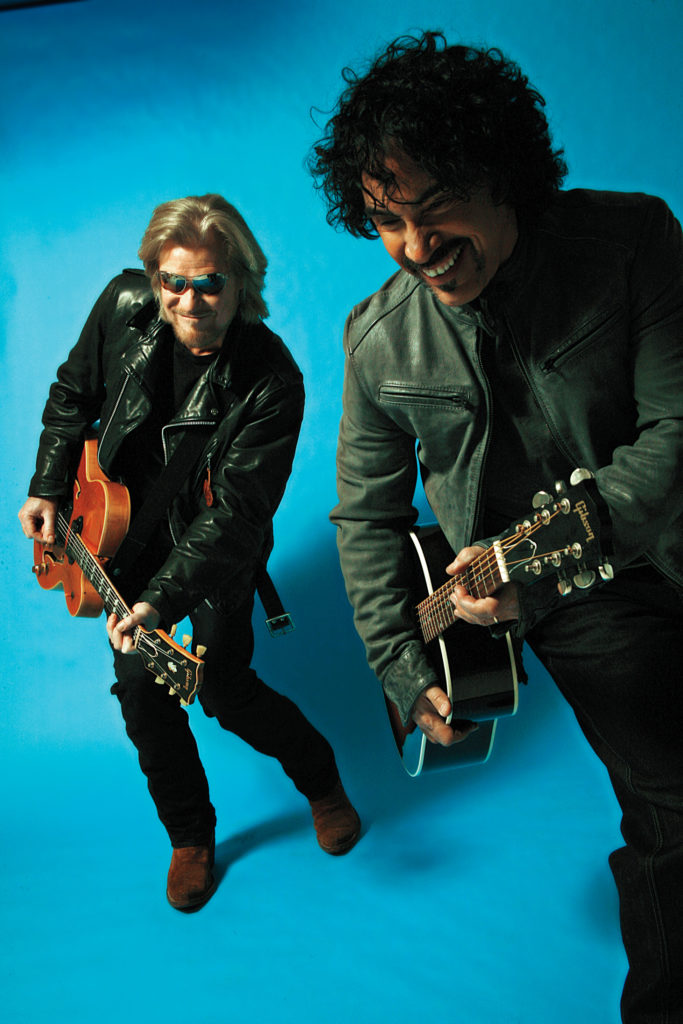
Oates: We’re not recording because we feel we’ve said so much. We’ve been together for 50 years––I mean, c’mon. We have a catalog!
Hall: I’ve been working on a solo record. One never knows. John and I might do some things. We haven’t really discussed it, but it is a possibility.
MC: Can you talk a little more about your solo album, Daryl? Are you in the studio recording it?
Hall: Off and on. I’m so busy, and I’ve had so many starts and stops for various reasons that my momentum is a little off. In a way that’s good, because a lot has happened to me.
Oates: I’ve been promoting [2018’s] Arkansas for a year now. This year I’m going to take some time off. It’s a good year to regroup and enjoy the travel.
MC: Daryl, speaking of other projects you have in the works, are there any new episodes of Live From Daryl’s House coming up? [The last new episode came out on June 23, 2016.]
Hall: We’re basically ready to go back into production. We’ve already done two of them, and again, we have a little time constraint, because I’m getting so busy. But sometime this year, we’re going to start heading back into production. I don’t have any artists lined up yet, but it’ll be interesting, whatever happens. I’m looking forward to it.
MC: For the two you already shot, who participated on those?
Hall: I had Ty Taylor of Vintage Trouble, who’s great––great singer. And we had Tommy Shaw of Styx, that was interesting. So we started off with two completely different artists.
MC: Who is on your short list of musicians with whom you would most like to collaborate?
Hall: Oh, man. That’s a hard question for me to answer, because collaboration has a lot to do with chance. It’s like saying, “Of all the girls in California, which girl would you most like to hang out with?” Oh, boy. You gotta meet them first.
MC: When major artists come through Charleston, do you tend to meet them?
Hall: Charleston’s a small town, but there is a fairly vibrant music scene here. My stepdaughter is a musician, and she’s been hanging out and writing songs with people. I’ve been hanging around their studio and clubhouse, listening to what they’re doing.
MC: They must be blown away when you show up.
Hall: Nah, they’re used to me. [Laughs.]
MC: John, what advice do you give younger musicians when you talk with them, especially about how they should handle their money? [Oates has openly discussed losing all his savings in the early stages of his music career.]
Oates: I don’t. [Laughs.] If that ever comes up, I say, “Get a great lawyer, someone you can trust, and make yourself knowledgable about the business side of things.” … Younger artists [nowadays] are so much more experienced in the business side of things and take their careers much more seriously. There’s less frivolity and screw-up folks in the music business. Competition is so tough, and everyone realizes how difficult it is.
MC: Do you think that makes music these days more saccharin?
Oates: Ehh … not really. There’s still great music going on out there. Look at all the stuff coming out of the Dave Cobb camp and his studios: Chris Stapleton, Margot Price, Brandi Carlile. They’re making great music and making great songs. That roots music/Americana genre is where I want to be. I feel very comfortable there and have a lot of friends in it. For me, it’s the most vital music that’s out there.
MC: Daryl, what do you advise?
Hall: Play live. Get used to being in front of people. Try your ideas out in front of people. The essence of it all is being comfortable onstage and knowing who you are in that respect, and taking that knowledge and being uncompromising and do it in the studio.
MC: It seems like the Z-Generation has a real appreciation for ‘70s music.
Hall: It really is amazing. We’ve done surveys, and the bulk of our audience—by far—is between the ages of 20 and 30. The second-largest is between 12 and 20. This is our audience, this is who I play to. It’s quite amazing in so many ways. Time means nothing to new generations. They hear things and they either like it or don’t like it. It doesn’t matter when it was done. And all the kids I know are looking at music the same way.
MC: That must be hugely rewarding for you. I read a recent interview with you or John, and you talked about the importance of legacy. To see those young faces in the crowd so many years later …
Hall: It’s fantastic. Of all the things in my live career, that’s the thing that I’m so proud of. The word “pride” isn’t even right, because I don’t know what made it happen. There’s something in my music that causes this to occur, and I am very pleased and gratified by it.
Contact [email protected]
Check out Daryl Hall and John Oates on The Music Connection Podcast

